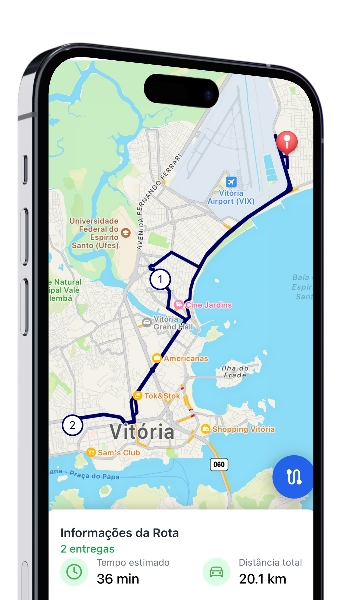In today's scenario of e-commerce growth and demand for fast deliveries, companies of all sizes face the challenge of optimizing their logistics operations. A tool that has become essential in this context is the delivery router. But after all, what exactly is a router and what are its main benefits? Let's explore this topic in detail.
What is a Delivery Router?
A delivery router is a technological solution that uses advanced algorithms to plan and optimize delivery routes for products or services. Unlike traditional manual planning, which takes time and is prone to inefficiencies, the router analyzes multiple factors simultaneously to determine the best route for each vehicle in the fleet.
These systems consider variables such as:
- Number of deliveries to be made
- Location of destinations
- Time windows for each delivery
- Vehicle capacity
- Traffic profile of the regions
- Road characteristics (circulation restrictions, tolls, etc.)
- Weather conditions
- Specific customer demands
Based on this analysis, the router defines the ideal sequence of stops, minimizing distances traveled, fuel consumption, and total operation time.
Main Benefits of Delivery Routers
1. Significant Reduction in Operational Costs
One of the most evident benefits of implementing a router is cost reduction. By optimizing routes, companies can:
- Reduce fuel consumption by up to 30%
- Decrease vehicle wear and tear
- Minimize overtime payments
- Optimize fleet usage, avoiding the need for additional vehicles
Studies indicate that companies adopting professional routers can save between 15% and 25% of their total logistics costs.
2. Increase in Productivity
With well-planned routes, the delivery team can:
- Make more deliveries within the same time period
- Reduce idle time between deliveries
- Avoid congestions and inefficient routes
- Follow a more precise and realistic schedule
On average, companies report a 20% increase in team productivity after implementing an efficient router.
3. Improvement in Customer Experience
Customer satisfaction is directly impacted by delivery efficiency. With a router, it is possible to offer:
- More precise delivery windows
- Real-time updates on delivery status
- Greater punctuality
- Order tracking capability
- Reduction in problematic or delayed deliveries
Customers satisfied with the delivery experience are up to 95% more likely to make repeat purchases with the same company.
4. Scalability of Operations
A common challenge in logistics operations is maintaining efficiency as demand grows. The router allows:
- Accommodation of sudden increases in delivery volume (as in seasonal dates)
- Rapid adaptation to new service areas
- Integration of new vehicles and drivers into the system without loss of efficiency
- Management of complex operations with multiple distribution centers
5. Data-Driven Decision Making
Modern routers offer dashboards and detailed reports that allow:
- Performance analysis by region, driver, or period
- Identification of operational bottlenecks
- Demand forecasting and capacity planning
- Continuous optimization of logistics processes
6. Environmental Sustainability
Route optimization also contributes to reducing the company's environmental footprint:
- Less CO₂ emissions due to reduced mileage
- Decrease in fossil fuel consumption
- Less urban congestion
- Alignment with corporate sustainability goals
How to Choose the Ideal Router for Your Company
To select the most suitable system for your needs, consider:
Size of Operation
Small companies with few daily deliveries can benefit from simpler solutions, while complex operations require robust systems with advanced processing capacity.
Integration with Existing Systems
The router should integrate easily with your ERP, WMS, e-commerce, or other systems already used by the company.
Specific Features
Evaluate whether you need features like real-time tracking, customer communication, document management, digital proof of delivery, among others.
Usability and Support
The interface should be intuitive to facilitate team adoption, and technical support should be agile and efficient.
Mobility
Check if the system offers mobile apps for the delivery personnel and if it works offline in areas with limited connectivity.
How My Tracking Will Help You
A delivery router is no longer a differentiator but a necessity for companies that want to stay competitive in today's market. The benefits go far beyond simple fuel savings, positively impacting the entire logistics chain and the end customer experience.
The successful implementation of a router can transform a company's logistics from a cost center into a strategic differentiator, generating significant competitive advantages and paving the way for sustainable growth.
In a world where logistics efficiency has become as important as product quality, investing in a good delivery router is a decision that will certainly bring expressive returns to your business.











